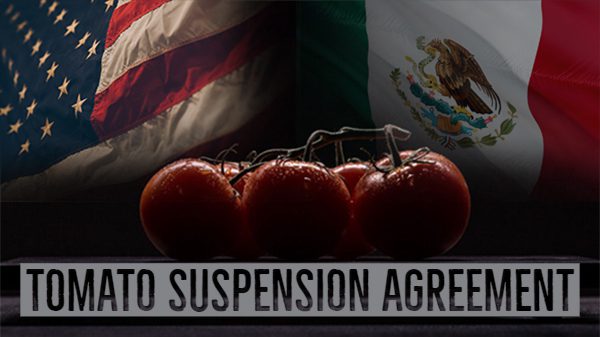PRESS RELEASE — U.S. Senators Martha McSally (R-AZ) and Kyrsten Sinema (D-AZ) expressed their concerns about provisions in the Department of Commerce’s latest tomato suspension agreement proposal which would be detrimental to Arizona’s economy and workforce.
“We trust that the Department shares our goals of supporting U.S. jobs and giving U.S. consumers choices in their fresh produce options,” the Senators wrote. “Accordingly, we must register our very significant concerns with two unworkable provisions contained in the draft Tomato Suspension Agreement proposed by the Department in July.
“First, the proposed agreement would unfairly require that every lot of fresh tomatoes imported from Mexico be inspected at the border…Second, the proposed agreement would infringe upon the statutory and contractual rights of U.S. buyers and sellers of Mexican tomatoes to be compensated for rejected tomatoes.
“Imposing unnecessary costs and burdens on the fresh produce trade hurts the economy of Arizona and eliminates jobs in the state,” the Senators continued. “We urge the Department to keep this in mind as it considers a new Tomato Suspension Agreement.”
The full text of the letter can be found HERE and below.
The Honorable Wilbur Ross
Secretary
U.S. Department of Commerce
1401 Constitution Ave, NW
Washington, DC 20230
Dear Secretary Ross:
Thank you very much for the continued work by the Department of Commerce to reach a new agreement to suspend the anti-dumping investigation on imported fresh tomatoes from Mexico.
Trade of fresh produce with Mexico directly supports a significant number of jobs in our home state of Arizona and across the Southwest border region. Ensuring that this trade continues as freely and robustly as possible is a top priority for us.
We trust that the Department shares our goals of supporting U.S. jobs and giving U.S. consumers choices in their fresh produce options. Accordingly, we must register our very significant concerns with two unworkable provisions contained in the draft Tomato Suspension Agreement proposed by the Department in July.
First, the proposed agreement would unfairly require that every lot of fresh tomatoes imported from Mexico be inspected at the border. Inspection data from the U.S. Department of Agriculture show that there is no legitimate commercial purpose for a 100 percent inspection mandate on imported Mexican tomatoes. Instead, the inspections would just serve as an artificial barrier to trade. Not only would the inspections add around $270 million in costs, but the Mexican government is likely to impose reciprocal inspections on U.S. exports, further hurting Arizona jobs. And a full-inspection mandate is particularly ill-advised at a time when the land ports of entry are facing delays from staffing and infrastructure shortages.
Second, the proposed agreement would infringe upon the statutory and contractual rights of U.S. buyers and sellers of Mexican tomatoes to be compensated for rejected tomatoes. This provision would create an uneven playing field for domestic sales of imported tomatoes and make it exceedingly difficult for U.S. importers of Mexican tomatoes to compete with other sellers.
Imposing unnecessary costs and burdens on the fresh produce trade hurts the economy of Arizona and eliminates jobs in the state. We urge the Department to keep this in mind as it considers a new Tomato Suspension Agreement.
Thank you very much for your attention to this important issue, and we look forward to hearing from you.



